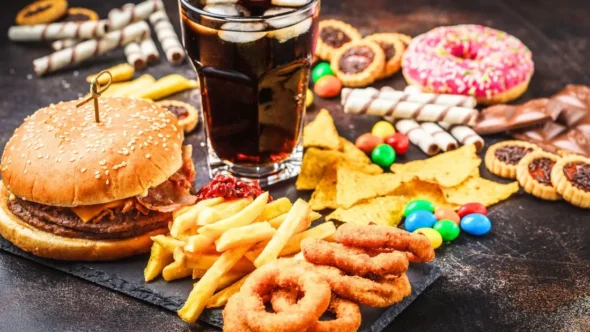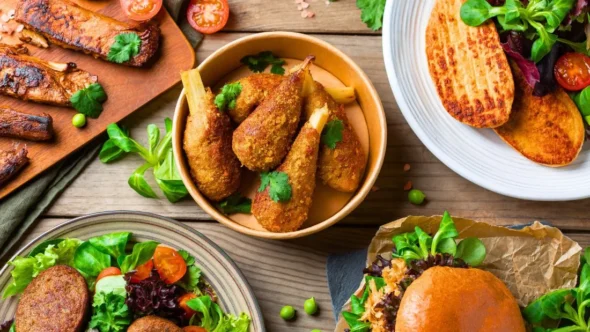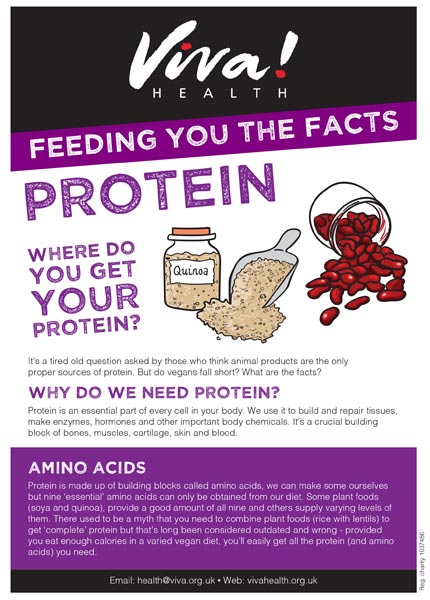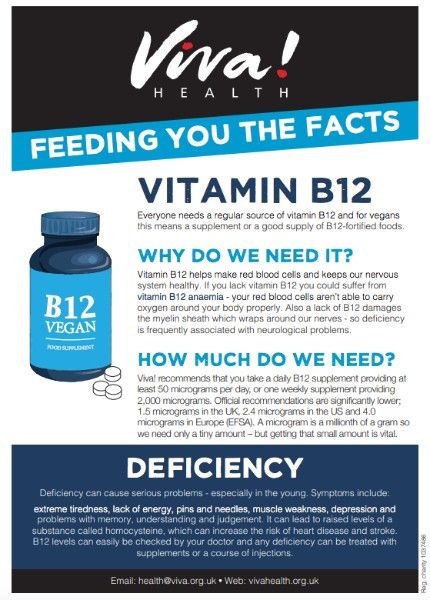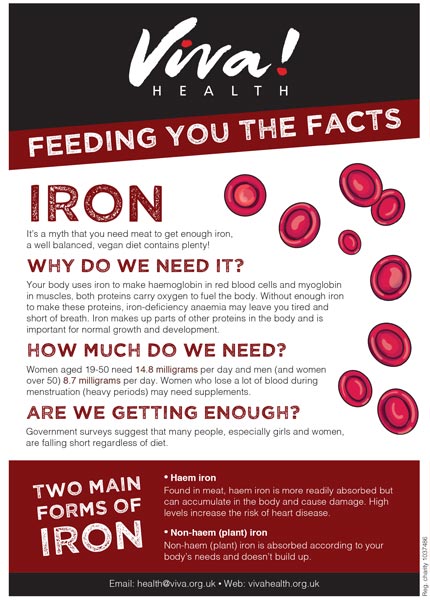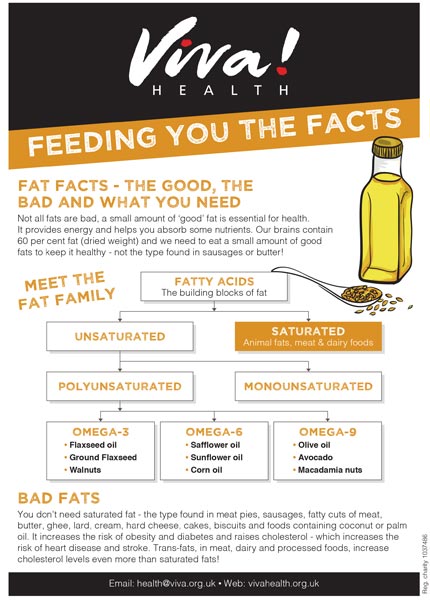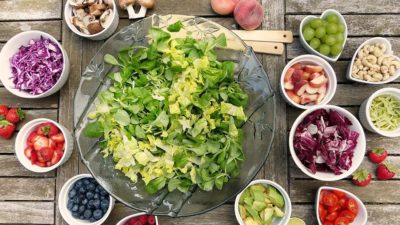Fake news about fake meat
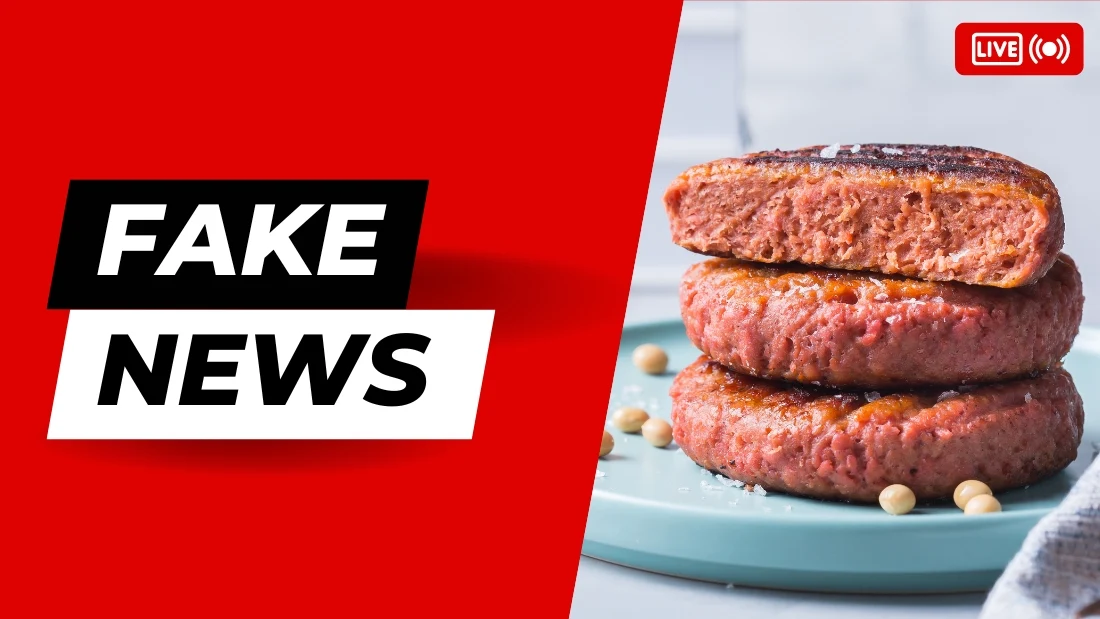
Are plant-based meat alternatives healthier than meat? No, according to the meat industry; yes, according to science
Because of people’s concerns about our collapsing environment, their health and animal welfare, ‘alternative proteins’ – better known as mock meats – have mushroomed. Meat-free sausages, burgers, steaks, hot dogs, schnitzels, goujons, nuggets and fishless fish are in every supermarket. Their aim is to mimic the taste and texture of meat and are largely aimed at flexitarians who want to reduce their meat intake. But are they better for you or worse than their animal-based equivalents? The meat industry, perhaps not surprisingly, would have you believe they’re worse.
Let science not marketing men be the judge! Here we compare vegan meat alternatives with the meaty products they replace.
Old school
Vegans didn’t invent alternative proteins; people have been eating them for centuries. Ancient meat alternatives include tofu, originally from China and made by mixing soya milk with a setting agent such as calcium sulphate. Wash the starch out of wheat flour, cook what’s left and you have wheat gluten. Better known as seitan, it has also been used in China for centuries and is rich in protein. Tempeh is fermented soya beancake from Indonesia and is another old stager. All of them provide a wide range of nutritional and health benefits.
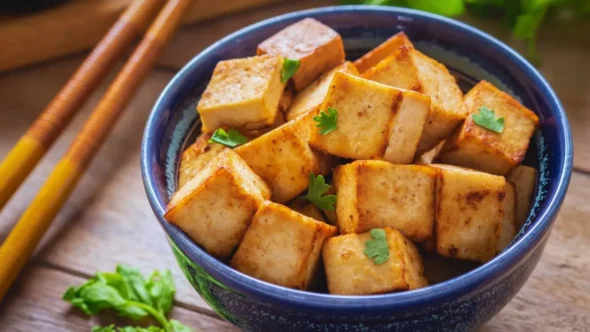
Tofu
It is the same with plant milks – in Britain back in the thirteenth century, almond milk was common – it was known that cow’s milk went rancid quickly (this was centuries before pasteurisation had been invented) and caused disease!
Meaty diseases
There are basic scientific facts that critics of mock meat ignore in their quest to keep you eating animal meat. Even low levels of consumption of meat are linked to obesity, diabetes, heart disease and cancer – the UK’s biggest killers. And The World Health Organisation says that processed meats, such bacon, ham, sausages, hot dogs and deli meats such as salami, are a Group 1 carcinogen. This means they cause cancer and are placed in the same hazard group as smoking and asbestos. Red meat, they add, also probably causes cancer. Only probably? Well, if you were told your holiday flight would probably crash, we somehow doubt you’d fly!
Find out more about how meat harms here.
A dangerous cocktail
Meat isn’t just meat but a conglomeration of different compounds, such as high levels of saturated fat, animal protein and haem iron and it is these that can seriously damage your health. High levels of saturated fat increase the risk of obesity, type 2 diabetes, heart disease and certain types of cancer, including breast, prostate and bowel cancers.
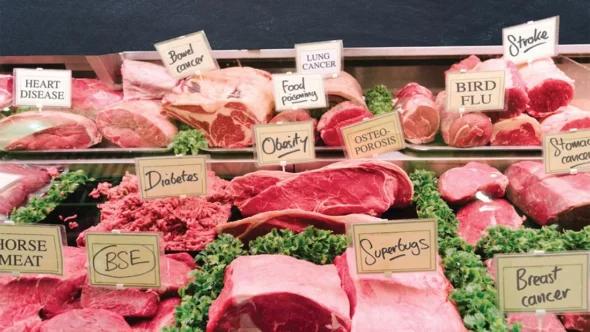
Meat is linked to heart disease, diabetes, cancer and many other diseases.
High animal protein intake increases in your kidney’s workload and lead to kidney problems. Animal protein also triggers the release of insulin-like growth factor 1 (IGF-1), a cancer-promoting growth hormone. High intake of haem iron, the type of iron found in meat, may increase the risk of bowel cancer. This may be because haem iron increases the formation of cancer-causing N-nitroso compounds in the gut. Non-haem-iron from plant foods does not have this negative effect.
Nitrites, used as a preservative in 90 per cent of all the bacon sold in Britain, are linked to the development of bowel, breast and prostate cancers. This is because when nitrites (and high levels of protein) are cooked at high heat, carcinogenic compounds called nitrosamines can form. This doesn’t happen with vegetables, some of which naturally contain nitrites, because they are rarely cooked at very high heat and don’t contain large amounts of protein like meat.
When meat is cooked at high temperatures other harmful compounds may be formed, such as polycyclic aromatic hydrocarbons and heterocyclic amines and these are also linked to cancer.
Food poisoning
Okay, you might say, don’t cook your meat so much, but then you risk food poisoning. A 2015 government survey found that 73 per cent of fresh chicken sold in the UK was contaminated with Campylobacter, the UK’s main cause of food poisoning. Symptoms include nausea, vomiting, diarrhoea and even death.
Most cases of food poisoning are caused by animal products (meat, poultry, eggs, fish and dairy) as plants tend not to carry the types of bacteria that cause it. If plant foods, such a salad leaves, do cause poisoning it’s often because they have been contaminated with animal faeces from the run-off water from animal agriculture.
Find out more about food poisoning here.
When people talk about meat eating being natural, they never put a figure on it by saying just how much constitutes ‘natural’. In West Africa, for example, the average intake is about 11 kilograms per person per year; in the US it’s a staggering 123 kilograms and in the UK, 84 kilograms – a mega difference and more than the European average of 78 kilograms. What we do know is that the more meat you eat, the greater your risk of deadly diseases. In the UK, we eat nearly double the global average of 45 kilograms and a third of adults exceed the limits for red and processed meat recommended in government guidelines (Stewart et al., 2021).
Swapping the meat you eat for plant-based foods can protect your health despite what the meat industry tells you, especially given that diets rich in fruit, vegetable, wholegrains, nuts and seeds are linked to lower levels of all the diseases common amongst meat-eaters. Yes, you say, but not all vegan diets are necessarily healthy, are they? What if you’re gorging on vegan sausages, burgers and bacon?
The usual arguments against vegan meat alternatives tend to focus on ‘missing nutrients’ and the levels of processing used in their manufacture. Okay, let’s have a look at these claims to see if they stand up.
Protein
The protein content of plant-based meat alternatives varies but many contain more protein than their meat equivalents. To be fair, research from the Food Foundation reckons that, on average, mock meats contain slightly less protein than animal meat (Gurung et al., 2024). But this, they say, is not a concern because the difference is small and most UK adults eat a lot more protein than is recommended. Current recommendations are 56 grams daily for men and 45 grams daily for women. On average, men eat about 85 grams and women, about 67 grams (Public Health England, 2020).
Nutrients in popular meat and plant-based burgers and sausages
| Birds Eye Original Beef Quarter Pounder Burgers 100g | Linda McCartney Vegetarian Quarter Pounders 100g | Richmond 8 Thick Pork Sausages 100g | Richmond 8 Meat Free Vegan Sausages 100g | |
|---|---|---|---|---|
| Calories (kcal) | 252 | 253 | 266 | 148 |
| Protein (g) | 16 | 21 | 10 | 8.7 |
| Fat (g) | 19 | 14.8 | 19 | 6.0 |
| Saturated fat (g) | 6.4 | 1.1 | 6.9 | 4.4 |
| Fibre (g) | 0.6 | 7.3 | 1.7 | 6.4 |
| Salt (g) | 0.78 | 1.3 | 1.9 | 1.5 |
Source: Ocado
Linda McCartney quarter pounders contain significantly more protein than Birds Eye beef quarter pounders (21 grams per 100 grams versus 15 grams) while Richmond meat and plant-based sausages contain a similar amount.
Protein Mini Factsheet
This mini factsheet provides you with all the information you need to know about protein.
Vitamin B12
Vitamin B12 really is vital as it helps make red blood cells and keeps your nervous system healthy. It’s naturally made by bacteria in soil and water but it can be grown in vats for use in supplements and to fortify foods.
B12 Mini Factsheet
This mini factsheet provides you with all the information you need to know about B12.
In the old days, people and animals got their B12 by eating food from the ground or drinking untreated water where it naturally hangs out but with so many farmed animals now confined in filthy factory farms, they have to be given B12 supplements – so much for the constant claim that meat is a natural source of this vital vitamin. Meat is not a ‘natural’ source of B12.
Interestingly, foods derived from animals, particularly pork products, contain around one-third less vitamin B12 (and iodine) when compared with the early 1990s (Niklewicz et al., 2023). Despite most people eating meat, low levels of B12 are not uncommon in the UK, with one-in-20 people aged 65 to 74 thought to be deficient, regardless of their diet (NHS, 2023).
The Food Foundation report also found that only a third of the more processed plant-based mock meats were fortified with vitamin B12. The simple solution is to encourage producers to improve fortification and to take a supplement to ensure you get enough. In fact, it’s recommended that anyone over 50 should take a B12 supplement as should all vegans.
Iron
Wholegrains, beans and tofu naturally contain iron as well as other micronutrients such as magnesium and B vitamins. The Food Foundation’s analysis found that only a third of new-generation meat alternatives (Beyond Meat, Vivera, Linda McCartney, Future Farm, This, Quorn, Richmond and Tesco own-brand) were labelled as including iron while 40 per cent of the processed traditional types (tofu, tempeh and seitan) listed iron as an ingredient. It’s likely that some of the foods that don’t list iron in the contents may still contain it as it may naturally be in some of the base ingredients, such as peas or soya. If you eat a healthy, vegan diet, packed with vegetables, wholegrains and pulses, you will most likely be getting sufficient iron.
One of the largest studies of vegetarians and vegans, the EPIC-Oxford study, compared the diets of over 18,000 meat-eaters, 4,500 fish-eaters, 6,600 vegetarians and 800 vegans and found that vegans had the highest intake of iron, followed by vegetarians then fish-eaters and meat-eaters coming last (Sobiecki et al., 2016). Other research has shown that around 80 per cent of most people’s iron comes from plant sources with cereals being the biggest contributor.
Iron Mini Factsheet
This mini factsheet provides you with all the information you need to know about iron.
Fat, fibre and salt
Most mock meats are lower in fat, especially the unhealthy saturated type of fat, and are much higher in fibre – not surprising as meat contains no fibre whatsoever unless it’s been specifically added – to burgers or sausages, for example. The Food Foundation report found that salt levels were slightly higher in new-generation meat alternatives but much lower in traditional ones and even lower in grains and beans (Gurung et al., 2024).
Again, it’s not surprising as other studies have shown that, on average, most plant-based meat alternatives contain less saturated fat, more fibre and similar levels of salt to meat (Nájera Espinosa et al., 2024).
Fat Mini Factsheet
This mini factsheet provides you with all the information you need to know about fat.
Ultra-processed foods
The description – ultra-processed foods (UPF) – is suddenly everywhere and applies to foods that undergo industrial processes such as hydrogenation and may contain dyes, stabilisers, flavour enhancers and emulsifiers. They are foods that are entirely altered and have high levels of unhealthy fats, refined sugars and salt. Produced in factories with industrial ingredients and additives invented by food technologists, they would certainly be hard to prepare at home.
While some vegan meat alternatives are UPF so too are many processed meat products, which are classed by the World Health Organisation as Group 1 carcinogens! Despite all the warnings, as a nation, we eat a huge quantity of these types of foods and they make up around 60 per cent of the average diet (Rauber et al., 2019), a figure that is likely higher for children. The majority of these products are not vegan.
The evidence is constantly growing that high levels of UPF are linked to obesity, type 2 diabetes, high blood pressure, heart disease, stroke, cancer and even depression! (Lane et al., 2024).
Are all ultra-processed foods (UPFs) equally bad and do vegan UPFs offer any health benefits? We answer these questions here.
Oxford University nutrition researcher, Dr Nicola Guess, says not all UPFs are created equal and that plant-based meat can be part of a healthy diet. Read more here.
Dodgy ingredients
Mock meats have been criticised for containing ingredients you would never find in your kitchen cupboards, such as methylcellulose, for example. Derived from cellulose, it is used as a binder, thickener or emulsifier in many products. Ironically, main users of methylcellulose are the processed meat and dairy industries! It is also used in some plant-based meats and many baked products such as bread. Recent studies suggest that methylcellulose could be replaced with fibre extracted from peas, citrus fruits and/or other fruit and vegetables.
We compared vegan meat alternatives with their meat equivalents and guess what? Many ingredients you would not have at home appear in the meat versions.
Ingredients of taste test-winning plant-based and meat burgers
| Plant Based by Asda Veggie Burgers* | Co-op GRO Crunchy Veg Burgers** | Aldi Plant Menu Vegetable Burgers** | Morrisons The Best Steak Burgers** | Tesco Finest Aberdeen Angus Beef Burgers** | M&S British Dry Aged Beef Burgers** |
|---|---|---|---|---|---|
| Vegetables (56%) [Carrots, Peas, Sweetcorn, Onions, Red Peppers, Green Beans, Leek, Cauliflower, Potatoes], Water, Fortified Wheat Flour [Wheat Flour, Calcium Carbonate, Iron, Niacin (B3), Thiamin (B1)], Potato Flakes, Rapeseed Oil, Salt, Yeast Extract, Sugar, Garlic Powder, Onion Powder, Yeast, Tomato Powder, Red Pepper Powder, Parsley, Sage, White Pepper, Flavouring, Black Pepper Extract, Sage Extract | Fortified Wheat Flour (Wheat Flour, Calcium Carbonate, Iron, Niacin, Thiamin), Water, Potato Flakes (8%), Onion (8%), Red Pepper (8%), Sweetcorn (8%), Carrot (7%), Parsnip (7%), Peas (7%), Cauliflower (7%), Sunflower Oil, Green Beans (3%), Salt, Yeast, Rapeseed Oil, Yeast Extract, Sugar, Garlic Powder, Onion Powder, Tomato Powder, Red Pepper Powder, Parsley, Sage, White Pepper, Flavouring, Black Pepper Extract, Sage Extract. | Vegetables (56%) (Carrot, Sweet Potato, Red Pepper, Sweetcorn, Green Beans, Peas, Cauliflower, Onion), | Beef Chuck (56%), Beef Brisket (40%), Water, Tapioca Starch, Salt, Black Pepper, Preservative (Sodium Metabisulphite), Rosemary Extract, Rapeseed Oil | Beef (91%), Water, Rice Flour, Dried Potato, Sea Salt, Yeast Extract, Black Pepper, Salt, Preservative (Sodium Metabisulphite), Rapeseed Oil, Emulsifier (Mono- and Diglycerides of Fatty Acids), Dextrose, Flavouring | Beef (72%), Dry Aged Beef (15%), Water, Roast Beef Stock (Water, Beef Bones, Roasted Tomato Purée, Kelp, Roasted Onions, Shiitake Mushrooms, Roasted Carrots, White Wine Vinegar), Rice Flour, Chickpea Flour, Beef Marrow, Salt, Dried Mushrooms, Cracked Black Pepper, Sunflower Oil, Cornflour, Preservative: E223 (Sulphites), Dextrose |
*Winners of the Which? Best veggie burgers, 2024.
**Winners of the Which? Best beef burgers, 2024.
The veggie burgers shown above are made using ingredients you would likely find in most homes, the same cannot be said for the meat burgers.
Many processed foods, both vegan and non-vegan, contain stabilisers, binding agents, gelling agents, preservatives and so on. That’s the nature of UPF and one of the reasons why they are not good for us. They can contain additives that may increase the risk of disease over time but while vegan burgers and sausages can’t really be described as healthy, some have better ingredients than others: eg Taifun Organic Tofu Grill Sausages are relatively good.
Some mock meats can still be relatively healthy in moderation. One study looked at plant-based mince, burgers, sausages and meatballs from the Meatless Farm company. They compared them with red meat, poultry, fish, eggs and cheese and after just four weeks, those eating the plant-based foods showed changes in their gut bacteria that ‘may confer significant and wide-ranging health benefits’ (Toribio-Mateas et al., 2021).
Viva! doesn’t recommend eating lots of processed foods but even so, it’s worth noting that those containing high-quality ingredients can provide health benefits when eaten in moderation.
Time to switch
A study of over 3,000 Brits found that on average, meat-eating adults consume the following each week: two bacon sandwiches, two plates of pasta with meat sauce, one spaghetti Bolognese, one meat fajita, one steak, two meat curries, one burger, one meat-based pie and one Full English breakfast (Quorn, 2021). It shows that a large proportion of the meat people eat is processed meat and that is linked to cancer and can’t under any circumstances be described as healthy! To reduce your risk of a string of diseases, it really is time to ditch meat and go vegan.
Viva!’s Vegan Recipe Club has plant-based versions of all your favourite dishes, from Spaghetti Bolognese to Chilli Non-Carne, tried-and-tested classics such as Mac & Cheese, Moussaka, Lasagne, Quiche and Vegan Chicken Tikka Masala – you can have all the flavour without the cruelty or the damaging health effects.
Anti-vegan propaganda
Articles attacking plant-based meat and dairy just keep coming and there is evidence that the meat industry is behind many of them and much of it is also being spread online. Recent research conducted by the Changing Markets Foundation found that one-quarter of all the social media posts they analysed disparaged plant-based meat and dairy by claiming they lack nutrition – ‘ultra-processed’ ‘Frankenfoods’ that can cause serious disease (Changing Markets Foundation, 2023). This misinformation was mostly driven by a small group of social media accounts associated with so-called wellness experts funded by the meat industry or far-right media and political figures (Changing Markets Foundation, 2023).

Daily Mail headline
Two main themes, they found, in posts promoting meat and dairy were: ‘health-washing’ – claiming that animal-based foods are essential for good health; and ‘greenwashing’ – presenting animal products as environmentally friendly. Both these are false narratives according to the Changing Markets Foundation who say these tactics are heavily used by meat and dairy companies for their corporate and product branding (Changing Markets Foundation, 2023).
Save the planet
The environmental case for going vegan is clear – it’s the most effective way to reduce your impact on every aspect of environmental damage, from global heating, land and water use to the loss of wildlife (Poore and Nemecek, 2018). Switching to plant-based proteins would not only significantly help the environment, it would also protect your health.
Multiple studies have found that plant-based meat is significantly better for the environment than animal meat. One study found that plant-based meat reduces environmental impact by 89 per cent.
Find out more about the devastating environmental impacts of animal agriculture here.
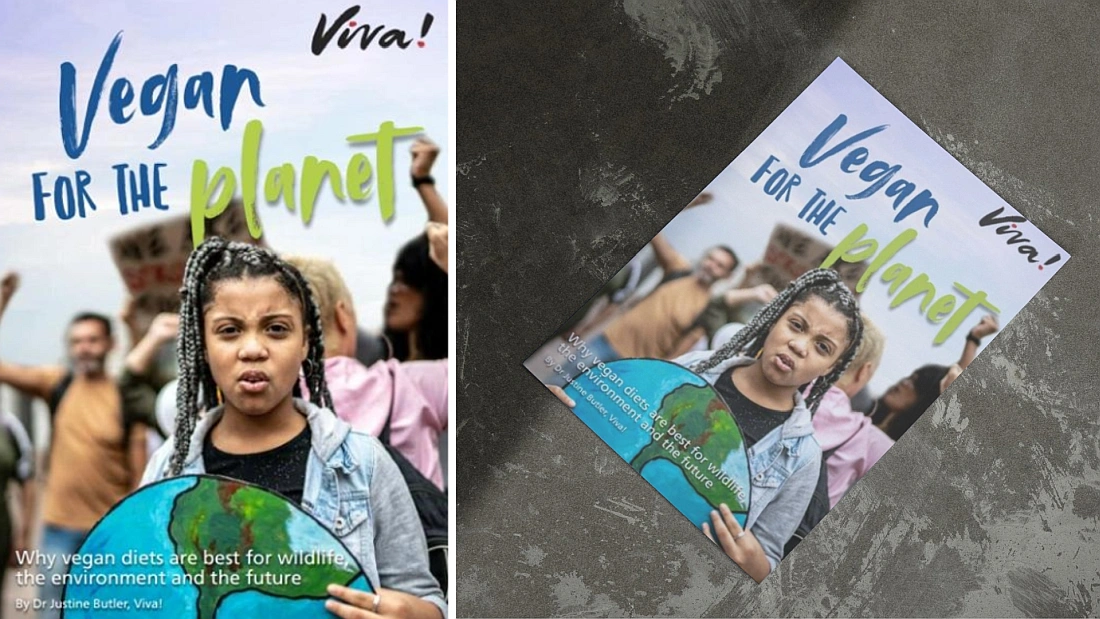
Vegan for the Planet Guide
This guide explains why animal agriculture is so damaging and how changing the way you eat is the single most effective action you can take as an individual to lower your impact on the planet.




